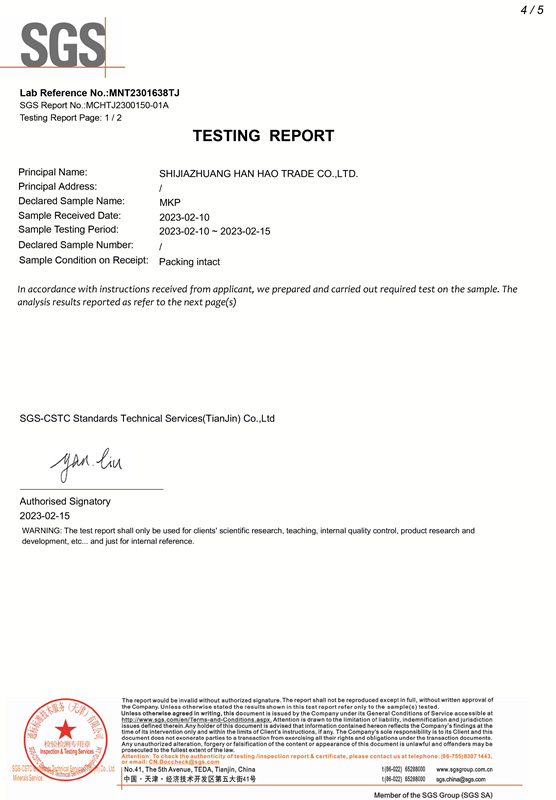
11月 . 11, 2024 14:36 Back to list
granular potassium sulfate
The Benefits and Applications of Granular Potassium Sulfate
Granular potassium sulfate (K2SO4), often referred to as SOP (sulfate of potash), is a potassium-rich fertilizer used widely in agriculture. Derived from both natural mineral sources and synthetic processes, it has gained significant attention due to its numerous benefits for crop production and environmental sustainability. This article explores the advantages and applications of granular potassium sulfate, highlighting its importance in modern farming practices.
Composition and Characteristics
Granular potassium sulfate is a white crystalline solid that contains about 50% potassium (K2O) and 18% sulfur (S). Its chemical properties make it a unique fertilizer that provides essential nutrients to plants, promoting healthy growth and development. Unlike other potassium fertilizers, such as potassium chloride (KCl), granular potassium sulfate is non-chloride, making it suitable for sensitive crops that do not tolerate high chloride levels.
Benefits of Granular Potassium Sulfate
1. Nutrient Supply As an excellent source of both potassium and sulfur, granular potassium sulfate plays a crucial role in plant metabolism. Potassium is vital for various physiological processes, including photosynthesis, enzyme activation, and water regulation. Sulfur is essential for protein synthesis and the formation of chlorophyll, which is critical for plant health.
2. Improved Crop Quality The application of granular potassium sulfate has been shown to enhance the quality of fruits, vegetables, and other crops. Potassium contributes to improved color, taste, and shelf-life, making products more appealing to consumers. For instance, potassium-enriched tomatoes often exhibit increased flavor and firmness.
3. Environmental Sustainability Unlike some other fertilizers that may lead to soil salinization or leaching, granular potassium sulfate is considered an eco-friendly option. It can improve soil health by promoting microbial activity and maintaining a balanced nutrient profile. Additionally, its sulfate content helps acidify alkaline soils, enhancing nutrient availability.
4. Reduced Chloride Toxicity Chloride can be harmful to many crops, particularly sensitive varieties like beans, potatoes, and tobacco. Granular potassium sulfate provides potassium without the chloride content found in potassium chloride fertilizers, making it an ideal choice for chloride-sensitive plants.
granular potassium sulfate

5. Enhanced Drought Resistance The relationship between potassium and water regulation in plants cannot be overstated. Adequate potassium levels help plants maintain turgor pressure, enabling them to withstand periods of drought more effectively. This trait is increasingly important in the face of climate change and unpredictable weather patterns.
Applications in Agriculture
Granular potassium sulfate is used across various agricultural sectors, including fruit trees, vegetables, and ornamental plants. Its application can be done through broadcasting, banding, or dissolving in irrigation systems, providing flexibility to farmers.
1. Field Crops Potassium sulfate is especially beneficial for crops like corn, soybeans, and wheat, where potassium plays a critical role in development and yield. Farmers often apply K2SO4 in the spring during planting or as a side-dress application when crops are in active growth.
2. Fruit Production In orchards, granular potassium sulfate is applied to enhance fruit size, sweetness, and overall quality. For example, apple and citrus growers frequently use SOP to improve fruit color and flavor while ensuring trees remain healthy and productive.
3. Vegetable Gardens Home gardeners also benefit from potassium sulfate; it helps achieve robust growth and vibrant colors in vegetables such as peppers, carrots, and leafy greens. Applying this fertilizer can lead to a bountiful and nutritious harvest.
4. Greenhouse and Ornamental Plants In controlled-environment agriculture, such as greenhouses, granular potassium sulfate is applied to support plant health and bloom development. It is especially important for flowering plants that require potassium for optimal flowering and fruiting.
Conclusion
Granular potassium sulfate emerges as a vital component of sustainable agricultural practices. Its ability to provide essential nutrients, improve crop quality, and enhance environmental health makes it a valuable tool for farmers seeking to maximize yields without compromising environmental integrity. As agriculture faces the challenges of climate change, population growth, and environmental degradation, potassium sulfate stands out as a viable solution to support food production and ensure the health of our planet. Whether for large-scale operations or home gardening, granular potassium sulfate proves to be an indispensable ally in the quest for successful and sustainable agriculture.
-
Premium 8 12 16 Fertilizer – High-Efficiency Compound & Granular NPK Supplier
NewsJun.10,2025
-
High Quality Agricultural Grade NPK Fertilizer Manufacturer & Supplier Reliable Factory Price
NewsJun.10,2025
-
Organic Fertilizer for Corn Boost Yield Sustainably
NewsJun.10,2025
-
Organic Fertilizer for New Plants Natural Growth Boost & Eco Nutrients
NewsJun.10,2025
-
Optimized Hydroponic NPK Fertilizer – Fast Growth & Nutrients
NewsJun.09,2025
-
Top-Rated NPK Fertilizer for Fruit Trees - Boost Growth & Yield
NewsJun.09,2025
